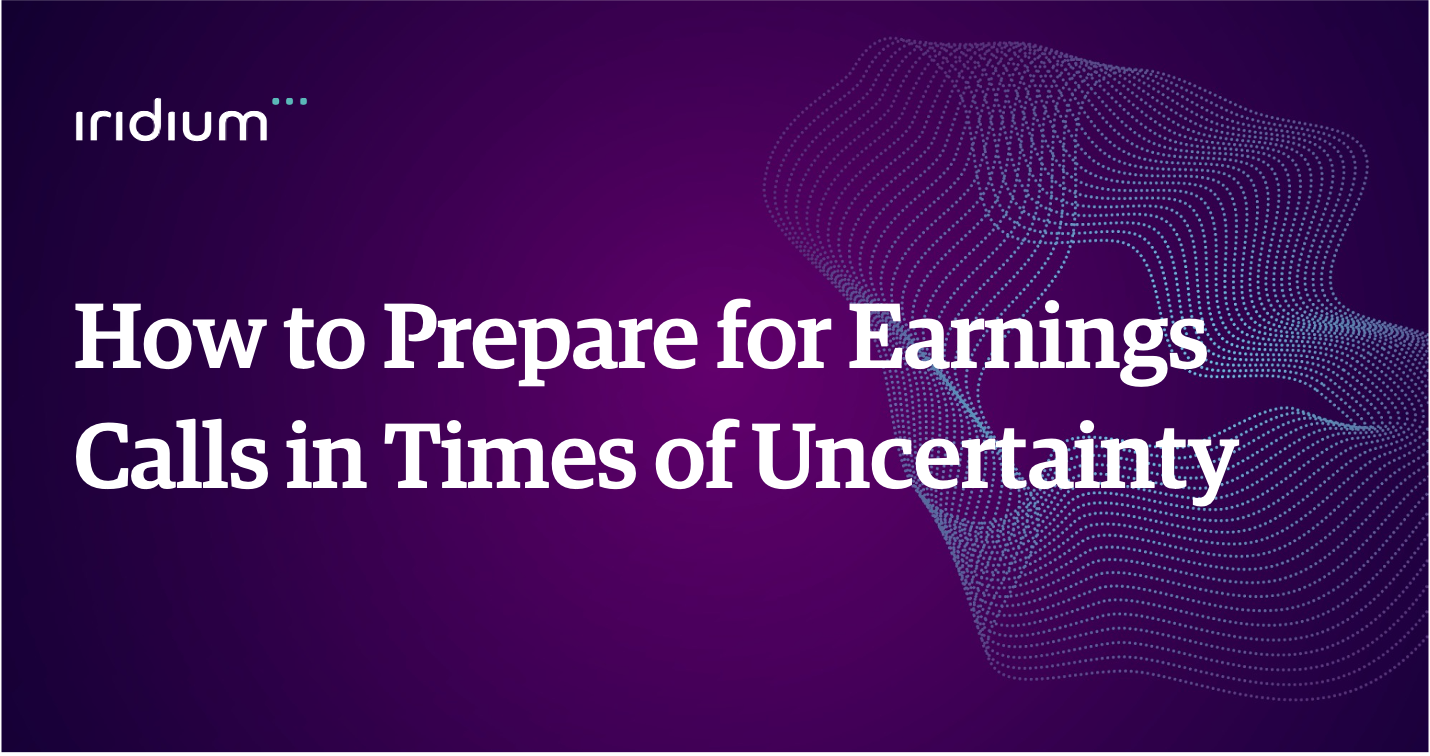How to Prepare for Earnings Calls in Times of Uncertainty
30 June 2022 | Admin

With the war in Europe supplanting concerns over Covid-19, rising interest rates, mounting inflation concerns, and fears of recession threatening capital markets, senior executives at listed companies are sure to find keen interest among analysts and investors as they ready their financial results.
How management presents its performance and responds to questions during the next earnings cycle will be a litmus test of whether they gain trust or lose confidence among those who share a material interest in the company.
Investment professionals tend to devote more time to forecasting the implications of a company's operating environment during times of crisis, so adequate preparation is key to meeting their expressed need for greater insight. Additionally, to deliver real value in dialogues that the investment community views as the most efficient mechanism for knowledge transfer, senior management must make a commensurate effort; more so if they wish to limit the impact of market uncertainty on their valuation.
Convincing information
Earnings call presentations that inform, involve, and instill confidence during these testing times serve companies and management teams best. Built on logically constructed narratives of the factors affecting their business, they need to use quantifiable language to recap strategic progress, decompose financial drivers, give operational updates, describe the impact of economic factors, and explain their guidance. When properly executed, they increase valuation accuracy and foster trust among stakeholders.
Unlike their peers, the most respected executives depart from the standard rehash of the press releases and financial statements distributed before earnings calls. Instead, they speak candidly about underlying drivers in their remarks, supplementing facts and figures on the printed page. They also pre-empt concerns and address them in the management presentation, rather than waiting for an analyst to pose a tricky question.
Finally, they temper the natural inclination to focus on past accomplishments and downplay risks, providing concise responses to audience questions on what lies ahead. In a region still warming to investor engagement as something more than an exercise in public relations, they understand that appearing ‘over-bullish’ erodes trust when it contrasts with market expectations. This danger becomes outsized in challenging market conditions.
A compelling story
The opportunity to address strategic, financial, and operational drivers makes the earnings call an ideal vehicle for building trust with the investment community. Tell the company’s story in an informative and engaging way, and analysts and investors will take heed. This is true in good times and bad. And it begins with preparation.
A storyline that flows step-by-step from results to guidance is central to adding value for earnings call audiences that expend considerable effort to listen to and form an opinion of a company and its executives. In addition to addressing the underlying drivers not mentioned in the pre-call materials, management should consider how their strategic responses to short-term challenges will relate to their long-term vision for the company.
More than a list of key messages and a data dump, the earnings call story should:
- Recap on events and milestones in the quarter
- Update on strategic progress and targets
- Report on operations and transformation efforts
- Self-assess prospects based on peer intelligence
- Provide earnings guidance based on underlying drivers
Aligning language with market expectations
Another key consideration when composing the earnings call narrative is the delta between the consensus expectations of the analysts covering the company and the actual financial results. Outperformance and underperformance may be down as much to tone and language as they are to market conditions.
Companies should avoid flowery language and nebulous descriptors. This is similar to being alert to the fact that IR is not PR. Engagement of the type that adds real value for analysts and investors is based less on financial successes expressed in hyperbolic terms. Rather, it is based on the realistic identification of risks to the business and the steps management is taking to mitigate them.
The ‘significance’ of an ‘extreme’ ‘boost’ adds nothing and means less. Instead, corporate executives should strive for linguistic precision. Analysts and investors appreciate honesty and will tend to support management even when performance fails to meet their expectations.
That precision extends to the earnings call. It should adhere to a pre-set agenda that aims to make the most efficient use of the limited time for those burdened by a crowded diary at the end of each earnings cycle.
Perfecting the delivery
Because there is no tolerance for error, executives must prepare and rehearse well in advance of the event. One area that requires constant upgrading and rehearsal is the act of delivering the presentation and answering audience questions. And this is so central to the success of the earnings call, and the reputation of company leaders, that it simply cannot be left to chance. Public speaking is hard, especially in an uncertain environment. But it is a skill like any other skill. It needs to be learned. It must be practiced. It must be perfected.
When preparing for a successful earnings call, executives should keep in mind:
- We don’t speak the way we write
- We don’t present the way we talk
- We don’t inspire by facts alone
By creating informative presentations that involve analysts and investors in their narratives on an emotional level, leaders can inspire the actions necessary to maximize support for their company. Exhibiting pragmatism and candor in equal measure, they can make the earnings call a primary vehicle for building trust with the investment community.
The Iridium team has developed an Earnings Call Masterclass for senior executives and IR professionals. If you feel anxious about what to say and how during the next earnings cycle, please get in touch.